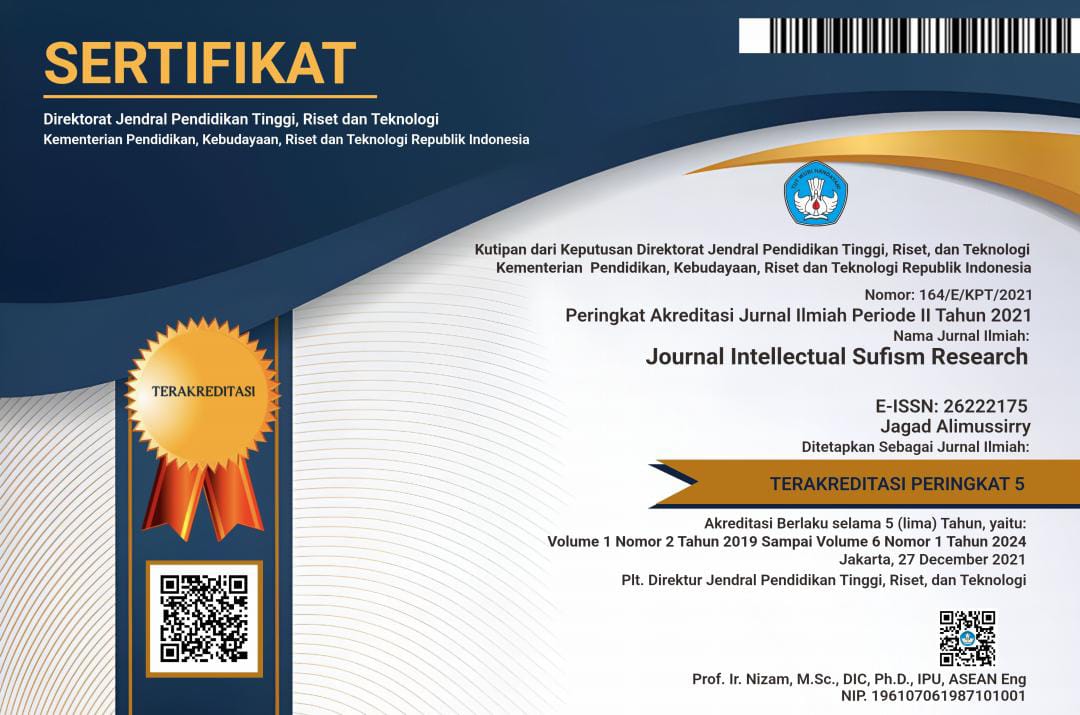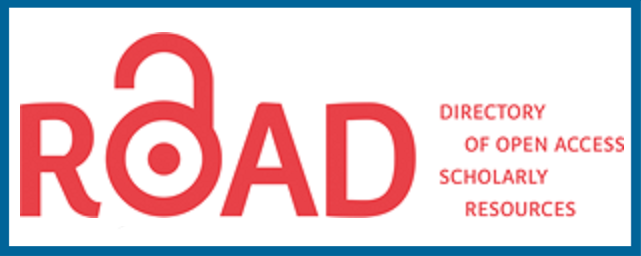The Creation of the Universe Judging from the Naqli and Aqli Propositions
DOI:
https://doi.org/10.52032/jisr.v5i1.138Abstract
This study aims to determine the basis, process, interrelationship, and urgency of the creation of the universe in terms of the naqli argument. This type of research is a qualitative research with library research method , which is a series of activities related to the method of collecting library data through reading, recording and processing research data by conducting a review study of books, literatures, notes. and reports related to the problem being solved. The results of the study indicate that the basis for the creation of the universe in terms of the naqli argument is explained in the verses of the Qur'an, including QS. Al-A'raaf [7]: 54, QS. Yunus [10]: 3, QS. Hud [11]: 7, al-Hadid [57]: 4, and others. The review of the naqli arguments explains that the process of creating the universe is divided into six stages, namely the big explosion, until the creation of animals and then humans. While the review of aqli theorems in science, the beginning of the creation of the universe was put forward by the Big Bang theory , Stephen Hawking, Rasyid Ridha, Marconi, and others. There are several links between the texts and the theories that have been put forward, including the process of creating the universe which is divided into six stages, the process of creating the universe comes from something solid, the material for the formation of the universe comes from water, the material for the creation of the heavens and the earth is a kind of smoke. (dukhon) . There is a link between the process of creating the universe, reviewing the naqli (al-Qur'an) and aqli (science) propositions with the finding of compatibility with scientific evidence that answers a lot of cues from the Qur'an, so as a believer, his faith should be more and more about the existence of Allah, the truth of Islam, and the truth of the holy verses of the Qur'an.
References
Supriadi, Akhmad, “Integrating Qur’an and Science: Epistemology of Tafsir Ilmi in Indonesiaâ€, Refleksi, Vol. 16, No. 2, (Oktober 2017), hal. 150.
Al-Qur’an al-Karim.
Asrori, Hadi, “Proses Penciptaan Alam dalam Enam Masa (Studi Komparatif Tafsir Al-Manar dan Al-Jawahir fi At-Tafsir Al-Qur’an Al-Karim)†2020
Ulum, Itah Miftahul, “Konsepsi Tauhid Menurut Muhammad Bin Abdul Wahab dan Implikasinya Bagi Tujuan Pendidikan Islamâ€, Jurnal Lemlit Unswagati (2013), hal 96
Itang, “Dasar Hukum Ekonomi Islamâ€, ISLAMICONOMIC: Jurnal Ekonomi Islam, Vol 5, No 2 (2014), hal. 1.
Laila, Izzatul, “Penafsiran Al-Qur’an Berbasis Ilmu Pengetahuanâ€, Episteme, Vol. 9, No. 1, (Juni 2014), Hal 54.
Kementerian Agama RI. “Al-Qur’an dan Tafsirnya (Edisi yang disempurnakan)â€. (Jakarta: Kementerian Agama RI, 2012)Jilid 7 hal 582
Lajnah Pentashihan Mushaf Al-Qur’an, Badan Litbang dan Diklat, Kementerian Agama RI dengan LIPI, “Tafsir Ilmi, Penciptaan Jagad Raya dalam Perspektif Al-Qur’an dan Sainsâ€. Lajnah Pentashihan Mushaf Al-Qur’an. 2010.
Zed, Mestika, “Metode Penelitian Kepustakaan†(Jakarta: Yayasan Pustaka Obor Indonesia, 2017), hal. 3.
Nareswari, Nanda Pramesti dkk., “Konsep Penciptaan Alam Semesta Menurut Pandangan Ibnu Rusyd dan Stephen Hawking dan Kaitannya Terhadap Kosmologiâ€, Zawiyah: Jurnal Pemikiran Islam Vol. 6, No. 2 (Desember 2020), hal 278.
Ardana, Nurni Amiroh Dwi Isma dan Purwoko, Budi, “Studi Kepustakaan Penerapan Konseling Naratif dalam Lingkup Pendidikanâ€. Jurnal BK Unesa. Vol 8. No. 2 (2018). hal. 80.
Nurrohman, “Ayat-Ayat Sainsâ€, (Yogyakarta: Noktah, 2019), hal 60.
Sugiyono, “Metode Penelitian Kuantitatif, Kualitatif, dan R&D.†(Bandung: Alfabeta, 2007), hal. 240-243.
Endraswara, Suwardi, “Metodologi Penelitian Sastraâ€, (Yogyakarta: tim redaksi CAPS, 2011), hal. 162-163.
Aiman, Umul, “Tafsir Bil’ilmi: Suatu Pengumulan Metode Tafsirâ€, Kalam: Jurnal Studi dan Pemikiran Islam, Vol. 2, (2011), hal. 245.
Cicilia, Yayuk, “Analisis Pemahaman Guru Mi Tentang Alam Semesta Meluas Dalam Perspektif Islam Dan Sainsâ€, Jurnal Basicedu, Vol. 6, No. 2 (Desember 2020), hal 110–116.
Ayani, Yuri Indri, dkk., “Mengungkap Isyarat-Isyarat Sains Dalam Hadis Nabiâ€, Jurnal al-Qur’an dan Hadis, Vol. 5, No. 1, (2021), hal. 360.













